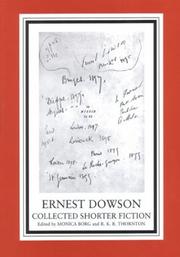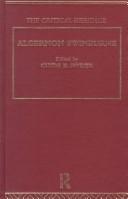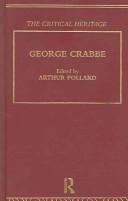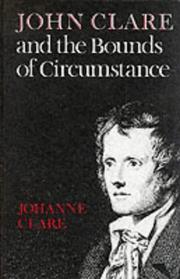| Listing 1 - 10 of 182 | << page >> |
Sort by
|

ISBN: 1283202670 9786613202673 1441111530 9781441111531 1902459253 9781902459257 9781283202671 6613202673 Year: 2003 Publisher: Edgbaston, Birmingham, UK Birmingham University Press
Abstract | Keywords | Export | Availability | Bookmark
 Loading...
Loading...Choose an application
- Reference Manager
- EndNote
- RefWorks (Direct export to RefWorks)
Ernest Christopher Dowson (1867-1900) is best known as a the author of a number of exquisite lyrics which epitomise the mood and style of the English 1890s - verses like 'cynara' and 'They are not long'. Yet Arthur Symons was only repeating what Dowson often himself asserted when he said that 'Dowson was the only poet I ever knew who cared more for his prose than his verse'. Monica Borg's Introduction suggests for the first time what lay behind Dowson's opinion of the importance of his prose, seeing withing it a programme of aesthetic and cultural radicalism. She places him firmly in relation to the late-nineteenth-century crisis of values, self and representation which Dowson both expressed and sought to precipitate, and she indicates that it is in his stories rather than his verse that Dowson shows how deeply implicated he was in the politics of resistance and cultural change that characterized the decadent literary and artistic movement. This edition provides texts of all of Dowson's short stories, thoroughly corrected from the original editions and with detailed notes on their genesis and development.
English literature --- Literature, Victorian --- Victorian literature
Book
ISBN: 0231548710 9780231548717 9780231190084 0231190085 Year: 2019 Publisher: New York
Abstract | Keywords | Export | Availability | Bookmark
 Loading...
Loading...Choose an application
- Reference Manager
- EndNote
- RefWorks (Direct export to RefWorks)
Since 2012, Public Books has championed a new kind of community for intellectual engagement, discussion, and action. An online magazine that unites the best of the university with the openness of the internet, Public Books is where new ideas are debuted, old facts revived, and dangerous illusions dismantled. Here, young scholars present fresh thinking to audiences outside the academy, accomplished authors weigh in on timely issues, and a wide range of readers encounter the most vital academic insights and explore what they mean for the world at large.Think in Public: A Public Books Reader presents a selection of inspiring essays that exemplify the magazine's distinctive approach to public scholarship. Gathered here are Public Books contributions from today's leading thinkers, including Jill Lepore, Imani Perry, Kim Phillips-Fein, Salamishah Tillet, Jeremy Adelman, Nathan Connolly, Namwali Serpell, and Ursula K. Le Guin. The result is a guide to the most exciting contemporary ideas about literature, politics, economics, history, race, capitalism, gender, technology, and climate change by writers and researchers pushing public debate about these topics in new directions. Think in Public is a lodestone for a rising generation of public scholars and a testament to the power of knowledge.
English literature --- Literature, Victorian --- Victorian literature
Book
ISBN: 0429439830 0429801203 9780429439834 9780429801204 9780429801211 0429801211 9780429801198 042980119X 9781138342231 Year: 2020 Publisher: Oxon New York
Abstract | Keywords | Export | Availability | Bookmark
 Loading...
Loading...Choose an application
- Reference Manager
- EndNote
- RefWorks (Direct export to RefWorks)
First published in 1999, this book asks what kind of advice was available to somebody wishing to embark upon oil painting in England between 1850 and 1900. It is a fascinating collection of Victorian instruction on how and what to paint, linked to crucial advice about art, its meaning and its relation to contemporary life, given by practising artists, important and often popular in their time, but whose lectures and writings are long overdue for reappraisal: Leslie, Hamerton, O'Neil, Poynter, Watts, Leighton, Armitage, Quilter and Herkomer. Here, beyond the familiar voices of Ruskin, Whistler and Pater, we have a whole range of experience from an age in which issues about painting were hotly debated by large numbers of people: professional artists, amateurs, critics, gallery-goers and Academy students. This anthology brings back to life the humour, seriousness, ambitions, eccentricities and controversies of people whose work shaped the nature of mainstream Victorian art.

ISBN: 128033617X 020319943X 1904494870 1134781938 0415134498 0415867347 9780203199435 9781134781898 9781134781935 9781134781942 9780415134491 9780415867344 Year: 1995 Publisher: London New York Routledge
Abstract | Keywords | Export | Availability | Bookmark
 Loading...
Loading...Choose an application
- Reference Manager
- EndNote
- RefWorks (Direct export to RefWorks)
The Critical Heritage gathers together a large body of critical sources on major figures in literature. Each volume presents contemporary responses to a writer's work, enabling student and researcher to read the material themselves.
English literature --- Clare, John, --- Literature, Victorian --- Victorian literature

ISBN: 1134781733 1280217561 0203194276 0203286278 0415134544 0415756758 9780203286272 9780415134545 9780203194270 Year: 2003 Publisher: London New York Routledge
Abstract | Keywords | Export | Availability | Bookmark
 Loading...
Loading...Choose an application
- Reference Manager
- EndNote
- RefWorks (Direct export to RefWorks)
The Critical Heritage gathers together a large body of critical sources on major figures in literature. Each volume presents contemporary repsonses to a writer's work, enabling students and researchers to read the material themselves.
English literature --- Swinburne, Algernon Charles, --- Literature, Victorian --- Victorian literature
Book
ISBN: 1443875155 1322889791 9781322889795 9781443875158 9781443870849 1443870846 Year: 2015 Publisher: Cambridge Scholars Publishing
Abstract | Keywords | Export | Availability | Bookmark
 Loading...
Loading...Choose an application
- Reference Manager
- EndNote
- RefWorks (Direct export to RefWorks)
Travel literature has always been associated with the construction of utopias which were founded on the idea of unknown lands. During their journeys in foreign lands, British travelers tended to formulate various critical opinions based on their background knowledge of the country visited. Their attempts to interpret other nations were often misinterpretations of the peoples in question as the Other. At the close of the eighteenth century, when Grand Tourism started to fade away and travelling became a mainstream activity for the middle-class Briton, travel writers attempted to identify with
English literature --- Literature, Victorian --- Victorian literature --- History and criticism.
Book
Year: 2014 Publisher: Project Gutenberg
Abstract | Keywords | Export | Availability | Bookmark
 Loading...
Loading...Choose an application
- Reference Manager
- EndNote
- RefWorks (Direct export to RefWorks)

ISBN: 1134781806 1280326662 0203194438 0203286286 0415134528 041575674X 9780203286289 9780203194430 9780415134521 9781134781799 1134781792 9781134781805 9781134781751 9780415756747 1432652516 Year: 1995 Publisher: London New York Routledge
Abstract | Keywords | Export | Availability | Bookmark
 Loading...
Loading...Choose an application
- Reference Manager
- EndNote
- RefWorks (Direct export to RefWorks)
The Critical Heritage gathers together a large body of critical sources on major figures in literature. Each volume presents contemporary responses to a writer's work, enabling students and researchers to read the material themselves.
English literature --- Clough, Arthur Hugh, --- Literature, Victorian --- Victorian literature --- Clough, A. H.

ISBN: 0415862388 1134782438 1280324929 0203196317 0415134382 0585462194 9780203196311 9780585462196 9781134782383 9781134782420 9781134782437 9780415134385 9780415862387 113478242X Year: 1995 Publisher: London Routledge
Abstract | Keywords | Export | Availability | Bookmark
 Loading...
Loading...Choose an application
- Reference Manager
- EndNote
- RefWorks (Direct export to RefWorks)
The Critical Heritage gathers together a large body of critical sources on major figures in literature. Each volume presents contemporary responses to a writer's work, enabling student and researcher to read the material themselves.
English literature --- Crabbe, George, --- Criticism and interpretation. --- Literature, Victorian --- Victorian literature --- Crabbe,

ISBN: 1282850962 9786612850967 0773561390 9780773561397 0773506063 9780773506060 9781282850965 6612850965 Year: 1987 Publisher: Kingston [Ont.] McGill-Queen's University Press
Abstract | Keywords | Export | Availability | Bookmark
 Loading...
Loading...Choose an application
- Reference Manager
- EndNote
- RefWorks (Direct export to RefWorks)
The author suggests that the full significance of Clare's contribution to English literature is found not in his social criticism, but in his refusal to dissociate himself from his past or to become assimilated into the mainstream of English culture at the expense of his class-identity. She argues that a clear set of aesthetic principles informs his finest work and provides the first thematic and structural classification of his poetry. Focussing on the major vocational poems and selected passages from the prose, she shows how Clare formulated the creative ideas and rhetorical techniques that allowed him to give unified expression to both his social and literary concerns. Clare's deep involvement with nature and rural England was not only the basis for his poetry, but also enabled him to articulate beliefs which opposed the inhumane values of his time.
English literature --- Literature, Victorian --- Victorian literature --- Clare, John, --- Criticism and interpretation. --- Political and social views.
| Listing 1 - 10 of 182 | << page >> |
Sort by
|

 Search
Search Feedback
Feedback About UniCat
About UniCat  Help
Help News
News